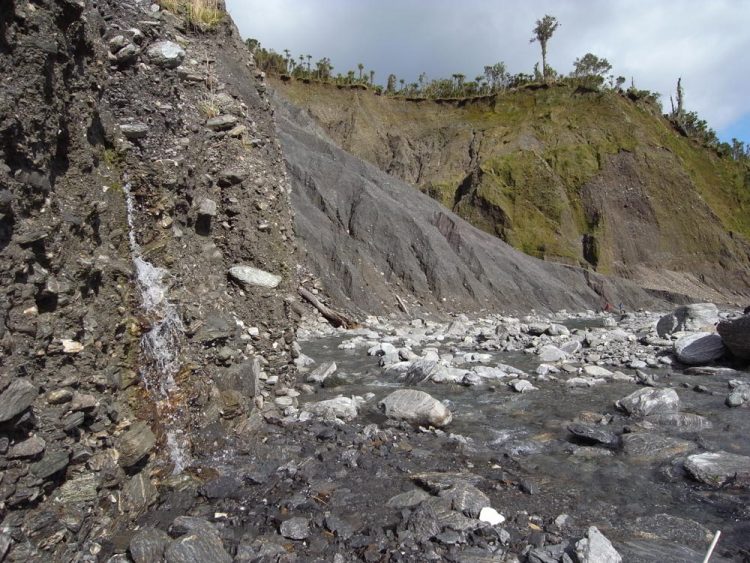How do Landslides control the weathering of rocks?

„Water flowing from the base of a landslide deposit, Gaunt Creek, Western Southern Alps of New Zealand “ (Foto: N. Hovius, GFZ)
Chemical weathering of rocks over geological time scales is an important control on the stability of the climate. This weathering is, in turn, highly dependent on the mechanical erosion processes in the river catchments where it occurs.
Very high erosion rates in active mountain ranges, however, produce such large amounts of eroded rock and sediment that weathering cannot keep pace with erosion. This seemingly straightforward relationship is now put into question by a team of geoscientists from France and Germany.
In the Southern Alps of New Zealand, they found that landslides, despite only affecting a small part of the landscape, accelerate the weathering of the eroded material they create enormously. (current online edition, Nature Geoscience, 30.11.2015)
The researchers examined the relationship between landslides and their weathering impact with geochemical methods; they sampled a range of water sources from the study area, comparing leachate from the base of landslide deposits, streams from small catchments with no landsliding, and large rivers draining hundreds of square kilometres.
The study area in New Zealand is characterized by heavy rainfall and large earthquakes, which both act to generate bedrock landslides. The geoscientists discovered a strong correlation between the dissolved solutes in the sampled waters and the occurrence of landslides.
The ratio of Sodium to Calcium, for example, allowed clear distinction to be drawn between the sources, including distinguishing between water from landslides, deeper groundwater, or from hydrothermal springs.
“Over the whole range of scales, from a single hillslope to an entire mountain belt, the weathering of rocks is reflected in the pattern of the dissolved solutes of the surface water” explains Robert Emberson from the GFZ German Research Centre for Geosciences.
This systematic pattern is directly linked to the areas of landsclides.We find that systematic patterns in surface water chemistry are strongly associated with landslide occurrence at scales, “The impact on weathering from landslides that occurred even several decades ago is still clearly observed in the samples we collect today”, says GFZ scientist Emberson.
Although landslides and the mechanical erosion they cause, only affect small parts of the landscape at any given time, they create massive amounts of fresh mineral surfaces: every single piece of rock in the landslide deposit offers a surface where the water that seeps in can stimulate chemical processes.
Since the water does not run off at the surface but percolates slowly through the rock debris, it creates ideal conditions for rapid chemical weathering. Chemical weathering thus is controlled by landslides in active mountain belts.
The possible impact of this effect on the global climate remains to be investigated.
Robert Emberson, Niels Hovius, Albert Galy and Odin Marc: “Chemical weathering in active mountain belts controlled by stochastic bedrock landsliding”, Nature Geoscience, advance online publication, 30.11.2015, Doi: 10.1038/NEO2600
Media Contact
More Information:
http://www.gfz-potsdam.de/All latest news from the category: Earth Sciences
Earth Sciences (also referred to as Geosciences), which deals with basic issues surrounding our planet, plays a vital role in the area of energy and raw materials supply.
Earth Sciences comprises subjects such as geology, geography, geological informatics, paleontology, mineralogy, petrography, crystallography, geophysics, geodesy, glaciology, cartography, photogrammetry, meteorology and seismology, early-warning systems, earthquake research and polar research.
Newest articles

Innovative vortex beam technology
…unleashes ultra-secure, high-capacity data transmission. Scientists have developed a breakthrough optical technology that could dramatically enhance the capacity and security of data transmission (Fig. 1). By utilizing a new type…

Tiny dancers: Scientists synchronise bacterial motion
Researchers at TU Delft have discovered that E. coli bacteria can synchronise their movements, creating order in seemingly random biological systems. By trapping individual bacteria in micro-engineered circular cavities and…

Primary investigation on ram-rotor detonation engine
Detonation is a supersonic combustion wave, characterized by a shock wave driven by the energy release from closely coupled chemical reactions. It is a typical form of pressure gain combustion,…



